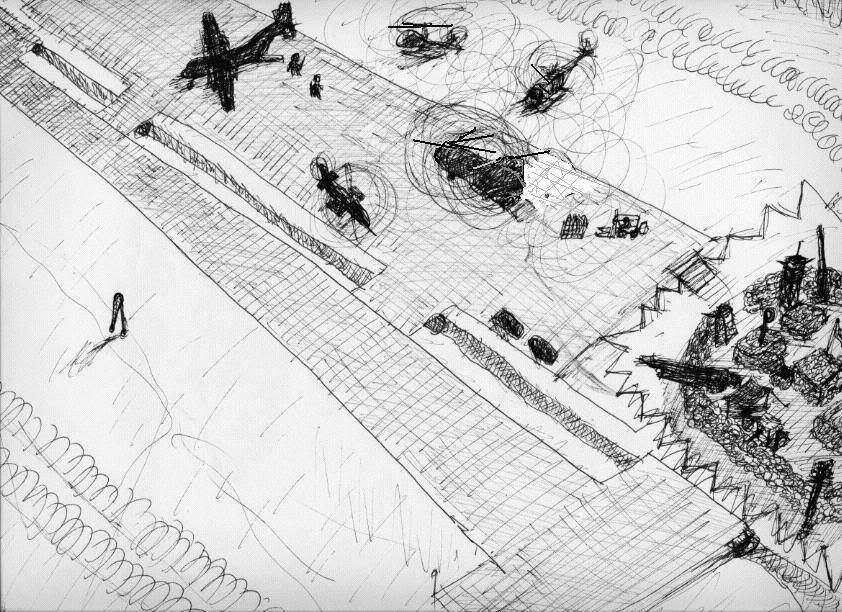Terminator here we come . . .
Posted: February 16th, 2005, 8:15 pm
and you thought Star Wars was a crazy u.s. govt venture!!
what if the problem is that our current soldiers are already to robot-like? only in the defense budget can more spending be the goal. this is truly scary. is the problem that military planners read too many sci fi books/movies or that lawmakers don't read enough?
A New Model Army Soldier Rolls Closer to the Battlefield
By TIM WEINER, The New York Times
Feb. 16) - The American military is working on a new generation of soldiers, far different from the army it has.
"They don't get hungry," said Gordon Johnson of the Joint Forces Command at the Pentagon. "They're not afraid. They don't forget their orders. They don't care if the guy next to them has just been shot. Will they do a better job than humans? Yes."
The robot soldier is coming.
The Pentagon predicts that robots will be a major fighting force in the American military in less than a decade, hunting and killing enemies in combat. Robots are a crucial part of the Army's effort to rebuild itself as a 21st-century fighting force, and a $127 billion project called Future Combat Systems is the biggest military contract in American history.
The military plans to invest tens of billions of dollars in automated armed forces. The costs of that transformation will help drive the Defense Department's budget up almost 20 percent, from a requested $419.3 billion for next year to $502.3 billion in 2010, excluding the costs of war. The annual costs of buying new weapons is scheduled to rise 52 percent, from $78 billion to $118.6 billion.
Military planners say robot soldiers will think, see and react increasingly like humans. In the beginning, they will be remote-controlled, looking and acting like lethal toy trucks. As the technology develops, they may take many shapes. And as their intelligence grows, so will their autonomy.
The robot soldier has been a dream at the Pentagon for 30 years. And some involved in the work say it may take at least 30 more years to realize in full. Well before then, they say, the military will have to answer tough questions if it intends to trust robots with the responsibility of distinguishing friend from foe, combatant from bystander.
what if the problem is that our current soldiers are already to robot-like? only in the defense budget can more spending be the goal. this is truly scary. is the problem that military planners read too many sci fi books/movies or that lawmakers don't read enough?
A New Model Army Soldier Rolls Closer to the Battlefield
By TIM WEINER, The New York Times
Feb. 16) - The American military is working on a new generation of soldiers, far different from the army it has.
"They don't get hungry," said Gordon Johnson of the Joint Forces Command at the Pentagon. "They're not afraid. They don't forget their orders. They don't care if the guy next to them has just been shot. Will they do a better job than humans? Yes."
The robot soldier is coming.
The Pentagon predicts that robots will be a major fighting force in the American military in less than a decade, hunting and killing enemies in combat. Robots are a crucial part of the Army's effort to rebuild itself as a 21st-century fighting force, and a $127 billion project called Future Combat Systems is the biggest military contract in American history.
The military plans to invest tens of billions of dollars in automated armed forces. The costs of that transformation will help drive the Defense Department's budget up almost 20 percent, from a requested $419.3 billion for next year to $502.3 billion in 2010, excluding the costs of war. The annual costs of buying new weapons is scheduled to rise 52 percent, from $78 billion to $118.6 billion.
Military planners say robot soldiers will think, see and react increasingly like humans. In the beginning, they will be remote-controlled, looking and acting like lethal toy trucks. As the technology develops, they may take many shapes. And as their intelligence grows, so will their autonomy.
The robot soldier has been a dream at the Pentagon for 30 years. And some involved in the work say it may take at least 30 more years to realize in full. Well before then, they say, the military will have to answer tough questions if it intends to trust robots with the responsibility of distinguishing friend from foe, combatant from bystander.


